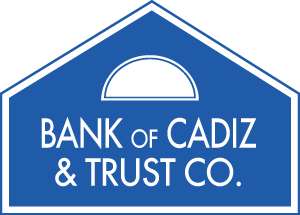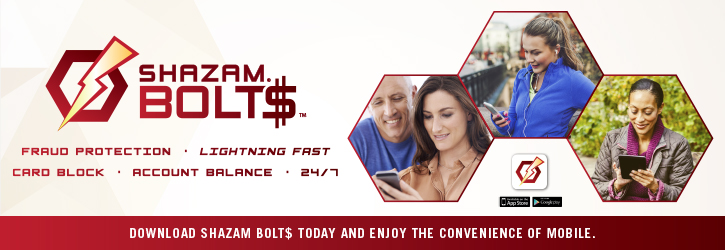Steps to Safeguard Your Identity
At Bank of Cadiz & Trust Co., we put a combination of safeguards in place to protect customers, including employee training, rigorous security standards, data encryption and fraud detection. On an individual basis, the following are other steps you can take to avoid becoming a victim.
- Do not give out personal information over the phone, through the mail or on the internet unless you've initiated the contact and are sure you know who you're dealing with. If you must share personal information, confirm that you are dealing with a legitimate organization . If you receive a phone call or email asking you to verify information, end the call, do not respond, and call the bank directly. Recent fraud scams use the practice of "pretext calling" where individuals claim to be a representative from a financial institution and ask to verify your personal information. Your financial institution already has your information on file and will never ask for your verification.
- Tear up or shred (preferably with a cross-cut shredder) receipts, old bank statements, unused credit card offers and financial information when it is no longer needed before throwing them away. This includes insurance and investment information, and utility bills. Crooks could steal information from your trash (known as "dumpster diving") and use it to get credit in your name. Don't leave sensitive documents containing personal information where anyone can see it.
- Do not carry identity documents (credit cards, social security card, passports) if they are not needed. If your I.D. or credit cards are lost or stolen, notify the creditors immediately, and ask the credit bureaus to place a "fraud alert" in your file. Memorize your passwords and PINS and never keep them in your wallet, purse, Rolodex or electronic organizer.
- Do not use your social security number or your driver's license number on checks.
- Review your bank and credit card statements for accuracy as soon as you receive them. Keep a list of all credit cards and bank accounts along with expiration dates and credit limits, as well as the telephone numbers of customer service and fraud departments. Store this list in a safe place.
- When going on vacation, temporarily stop mail delivery , the U.S. Postal Service will hold mail for you.
- Don't use an automatic log-in feature on your computer.
- Protect your PINs and computer passwords ; use a combination of letters and numbers (the longer and more complex a password is, the stronger it is, and change them more often. Never have this information where others may gain access to it. Do not use any part of your social security number, birth date, middle name, spouse's or child's name, mother's maiden name, address, or consecutive numbers . Instead, use something unique that only you know. Shield the keypad when using ATMs or when using debit cards at point of sale.
- Check your credit report. The Fair Credit Reporting Act requires each of the three national credit reporting companies to provide consumers with a free copy of their credit report once every 12 months (visit https://www.annualcreditreport.com) .
- Watch out for email related scams such as Phishing. Phishing occurs when a web page is copied or imitated. Users are misled into providing personal information. If you receive an email asking for personal information, do not hit the reply button or click on any website link in the email. Instead go directly to the sender's website by typing in the sender's website address. For more information on phishing, visit http://www.antiphishing.org/ . This link is to the Anti-Phishing Working Group, a trade association that includes law-enforcement officials. This site explains what "Phishing" is and offers advice on how to avoid becoming a victim.
- Update the virus protection software on your PC regularly ; do not open files from strangers or companies you do not know.
- Prevent the chances of spyware from being downloaded on your computer .
- Install and periodically update anti-spyware, virus protection and firewall software.
- Adjust browser settings to prompt the user whenever a website tried to install a new program or Active X control
- Carefully read all End User Licensing Agreements and avoid downloading software when licensing agreements are difficult to understand.
- Maintain current patches to operating systems and browsers.
- Do not open e-mail from untrustworthy sources
Bank of Cadiz & Trust Co. encourages consumers to follow these tips to safeguard personal data and help protect privacy. For more information, visit, https://www.ftc.gov/ or contact the bank.
Has someone stolen your personal information?
If you fear that someone has stolen your personal information, here are some indications that identity they may have occurred:
- Failing to receive bills or other mail on time
- Receiving credit cards for which you did not apply
- Denial of credit for no apparent reason
- Receiving calls from debt collectors or companies about products or services you didn't buy
ID Theft Victims: Immediate Steps
If you are a victim of identity theft, take the following 4 steps as soon as possible, and keep records of your conversations and copies of all correspondence.
- Place a "fraud alert" on your credit reports, and add a "victim's statement" to your file requesting that creditors contact you before opening new accounts in your name.
- Close the accounts that you know, or believe, have been tampered with or opened fraudulently. Call and speak to someone in the security or fraud department. Follow up in writing sent by certified mail, return receipt requested.
- File a "Miscellaneous Incidents" report at a police station where the identity theft occurred, and get a copy of the police report. It can help you deal with creditors who need proof of the crime.
- File a complaint with the Federal Trade Commission. You can file a complaint online at https://www.ftccomplaintassistant.gov/ ; call 1-877-ID-THEFT (877-438-4338); or write to Identity Theft Clearinghouse, FTC, 600 Pennsylvania Ave., NW, Washington, DC 20580.
Getting a Copy of Your Credit Report
Three Major Credit Bureaus:
- Equifax : 800-685-1111; http://www.equifax.com/home/en_us ; P.O. Box 740241, Atlanta, GA 30374
- Experian : 800-682-7654; http://www.experian.com/ ; P.O. Box 2104, Allen, TX 75013
- TransUnion : 800-916-8800; http://transunion.com ; P.O. Box 1000, Chester, PA 19022
A recent amendment to the federal Fair Credit Reporting Act entitles all individuals living in the United States to a free credit report, at their request, once every 12 months from each of the nationwide credit bureaus: Equifax, Experian and TransUnion.
To order your free annual report from one or all of the national credit bureaus, visit https://www.annualcreditreport.com/ ; call toll free 877-322-8228; or visit https://www.ftc.gov/ to print and complete the Annual Credit Report Request Form and mail it to: Annual Credit Report Request Service, P.O. Box 105281, Atlanta, GA 30348.
NOTE : Do not contact the three nationwide credit bureaus directly; they provide free annual credit reports only through the Annual Credit Report Request Service.
Reporting Fraud to the Credit Bureaus
Fraud alerts can help prevent an identity thief from opening accounts in your name. Contact one of the credit bureaus below to place a fraud alert on your credit report. The company you call is required to forward the information to the other two; which will also place an alert on your report.
- Equifax: 800-525-6285
- Experian: 800-397-3742
- TransUnion: 800-680-7289
Or write to Fraud Victim Assistance Division, P.O. Box 6790, Fullerton, CA 92834


